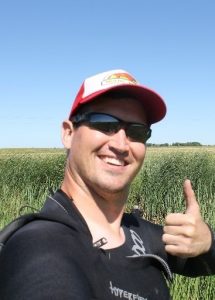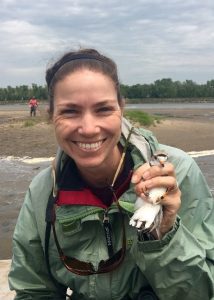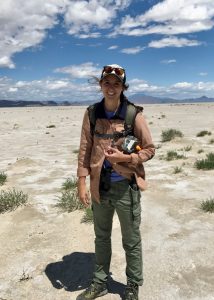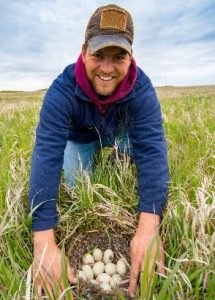Throughout the PPJV, retirements of the “boomer generation” have left behind big losses in capabilities. With an eye on the future, the U.S. Geological Survey’s Northern Prairie Wildlife Research Center (NPWRC) filled five vacated positions with talented early-career Research Scientists. Each of these scientists served as Post-Doctoral researchers at NPWRC before they were hired in permanent positions.
“Our goal with refilling these positions was to maintain key capabilities while doubling down on one of Northern Prairie’s primary strengths, which is providing information for the conservation of migratory bird populations and their habitats”, said Michael Anteau, Chief of the Wildlife and Ecosystems Branch at NPWRC. “These new staff really up our game by leveraging cutting-edge technology and analytical tools to address growingly-complex questions about ecosystems that support migratory birds”, said Anteau. According to Robert Gleason, NPWRC Center Director, “the backgrounds and current research focus of these scientists clearly align with the PPJV and JV8 priorities and these scientists are encouraged to work with JV partners.”
 Dr. Owen McKenna joined NPWRC in 2016 after completing his Ph.D. at Arizona State University. His research examined how climate change impacts ecology of desert playa wetlands. His research at NPWRC focuses on providing a mechanistic understanding of how wetland ecosystems respond to changes in climate and land use. Owen develops modeling tools that are informed by empirical data and scales up patterns and processes across regions with geospatial tools; these tools are used to inform conservation decisions for migratory birds and water quality and quantity in agricultural and grassland landscapes of the midcontinent. Contact: omckenna@usgs.gov Dr. Owen McKenna joined NPWRC in 2016 after completing his Ph.D. at Arizona State University. His research examined how climate change impacts ecology of desert playa wetlands. His research at NPWRC focuses on providing a mechanistic understanding of how wetland ecosystems respond to changes in climate and land use. Owen develops modeling tools that are informed by empirical data and scales up patterns and processes across regions with geospatial tools; these tools are used to inform conservation decisions for migratory birds and water quality and quantity in agricultural and grassland landscapes of the midcontinent. Contact: omckenna@usgs.gov |
 Dr. Rose Swift joined NPWRC in 2018 following her Ph.D. from Cornell University. Her research examined consequences of decisions about habitat use and species interactions on the survival, condition, and performance of Hudsonian godwits. At NPWRC, Rose focuses on the ecology and conservation of migratory birds, with an emphasis on population dynamics, effects of management actions, and habitat use questions. She has extensive ongoing work on federally listed birds breeding at rivers and depressional wetlands as well as grassland-nesting songbirds and migrant shorebirds. Rose hopes to continue to collaborate with partners to employ full annual cycle conservation of listed and declining migratory birds. Contact: rswift@usgs.gov Dr. Rose Swift joined NPWRC in 2018 following her Ph.D. from Cornell University. Her research examined consequences of decisions about habitat use and species interactions on the survival, condition, and performance of Hudsonian godwits. At NPWRC, Rose focuses on the ecology and conservation of migratory birds, with an emphasis on population dynamics, effects of management actions, and habitat use questions. She has extensive ongoing work on federally listed birds breeding at rivers and depressional wetlands as well as grassland-nesting songbirds and migrant shorebirds. Rose hopes to continue to collaborate with partners to employ full annual cycle conservation of listed and declining migratory birds. Contact: rswift@usgs.gov |
 Dr. Kristen Ellis joined NPWRC in 2019 after completing her Ph.D. at Colorado State University. She studied the breeding ecology of snowy plovers and developed field and analytical tools for partitioning different sources of nest failure, which can be used to understand efficacy of predation management actions for improving avian productivity. Her research at NPWRC is focused on migratory bird ecology and understanding how environmental threats during different periods of the annual cycle influence population dynamics and species-habitat associations. Additionally, Kristen is developing cutting-edge quantitative and geospatial tools for addressing conservation issues facing migratory birds. Contact: kellis@usgs.gov Dr. Kristen Ellis joined NPWRC in 2019 after completing her Ph.D. at Colorado State University. She studied the breeding ecology of snowy plovers and developed field and analytical tools for partitioning different sources of nest failure, which can be used to understand efficacy of predation management actions for improving avian productivity. Her research at NPWRC is focused on migratory bird ecology and understanding how environmental threats during different periods of the annual cycle influence population dynamics and species-habitat associations. Additionally, Kristen is developing cutting-edge quantitative and geospatial tools for addressing conservation issues facing migratory birds. Contact: kellis@usgs.gov |
 Dr. Jay VonBank joined NPWRC in 2020 after completing his Ph.D. at Texas A&M University – Kingsville. His research focused on movement ecology and decision-making strategies in greater white-fronted geese using GPS-accelerometer tracking devices. Jay’s research at NPWRC continues to use the movement ecology framework to understand impacts of environmental and land-use change on migratory bird population performance, particularly in waterfowl. His work explores intra- and inter-annual regional movements, behavioral influences on habitat use, spatiotemporal energy expenditure, and the influences of decision-making during migration on breeding performance throughout midcontinental North America. Contact: jvonbank@usgs.gov Dr. Jay VonBank joined NPWRC in 2020 after completing his Ph.D. at Texas A&M University – Kingsville. His research focused on movement ecology and decision-making strategies in greater white-fronted geese using GPS-accelerometer tracking devices. Jay’s research at NPWRC continues to use the movement ecology framework to understand impacts of environmental and land-use change on migratory bird population performance, particularly in waterfowl. His work explores intra- and inter-annual regional movements, behavioral influences on habitat use, spatiotemporal energy expenditure, and the influences of decision-making during migration on breeding performance throughout midcontinental North America. Contact: jvonbank@usgs.gov |
 Dr. Kyle McLean started as a research scientist in 2021, but he has been at NPWRC since 2009. Kyle completed M.S. and Ph.D. research projects working jointly with North Dakota State University and NPWRC. Kyle’s work has focused on factors influencing aquatic macroinvertebrates and community composition in prairie-pothole wetlands. He is currently developing statistical and mechanistic models for better understanding processes that maintain aquatic biodiversity in prairie-pothole wetlands and streams. Kyle’s goal is to provide resource managers with science-derived information needed to inform local management strategies (i.e., habitat improvement projects) and develop landscape-scale conservation plans. Contact: kmclean@usgs.gov Dr. Kyle McLean started as a research scientist in 2021, but he has been at NPWRC since 2009. Kyle completed M.S. and Ph.D. research projects working jointly with North Dakota State University and NPWRC. Kyle’s work has focused on factors influencing aquatic macroinvertebrates and community composition in prairie-pothole wetlands. He is currently developing statistical and mechanistic models for better understanding processes that maintain aquatic biodiversity in prairie-pothole wetlands and streams. Kyle’s goal is to provide resource managers with science-derived information needed to inform local management strategies (i.e., habitat improvement projects) and develop landscape-scale conservation plans. Contact: kmclean@usgs.gov |

